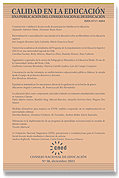Medidas afirmativas para mujeres en STEM: análisis comparado de su implementación en universidades chilenas
DOI:
https://doi.org/10.31619/caledu.n59.1382Palabras clave:
políticas de acción afirmativa, equidad de género, mujeres en STEM, educación superiorResumen
The persistent underrepresentation of women in Science, Technology, Engineering, and Mathematics (STEM) fields is a global concern, notably pronounced in Chile. This study investigates the recent adoption of affirmative actions, specifically preferential quotas, aimed at increasing female participation in these disciplines across four universities in the country. Our findings reveal that while the strategies and execution of these actions vary, they remain tethered to conventional admission protocols. Challenges arise in delineating eligibility criteria, underscoring the inherent tension between meritocratic principles and inclusive practices. While female students report higher levels of discomfort in terms of social and academic integration, they do not significantly differ from their male counterparts in academic performance, experiences of social marginalization, or encounters with discrimination. Notably, affirmative measures receive overwhelmingly positive evaluations from female and quota-admitted students. The latter group, in particular, places greater emphasis on gender as a salient factor in their university experience and identifies special admission as a potential source of discrimination, primarily from their male peers. This study recommends targeted efforts for awareness-building and dissemination of affirmative action policies, precise definition of entry requirements, and comprehensive strategies for the social and academic integration of students. These recommendations aim to foster an inclusive STEM environment that empowers women and promotes their equitable participation in these critical fields.
Descargas
Publicado
Número
Sección
Licencia
Derechos de autor 2023 Calidad en la Educación

Esta obra está bajo una licencia internacional Creative Commons Atribución 4.0.
Los autores conservan sus derechos de Copyright, sólo transfiere una parte de ellos a la revista aceptando los siguientes términos:
a.Los autores/as conservarán sus derechos de autor y garantizarán a la revista el derecho de primera publicación de su obra, el cual estará simultáneamente sujeto a la Licencia de reconocimiento de Creative Commons que permite a terceros compartir la obra siempre que se indique su autor y su primera publicación esta revista.
b. Los autores/as podrán adoptar otros acuerdos de licencia no exclusiva de distribución de la versión de la obra publicada (p. ej.: depositarla en un archivo telemático institucional o publicarla en un volumen monográfico) siempre que se indique la publicación inicial en esta revista.
c. Se permite y recomienda a los autores/as difundir su obra a través de Internet (p. ej.: en archivos telemáticos institucionales o en su página web) antes y durante el proceso de envío, lo cual puede producir intercambios interesantes y aumentar las citas de la obra publicada.
